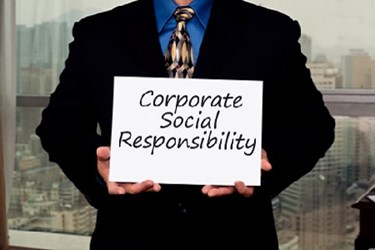Corporate Responsibility Influences Consumer Trust, Big Time
By Laurel Maloy, contributing writer, Food Online

Experts have long been saying that having consumers trust your brand equates to bigger profits. A recent study illustrates how the American food consumer evaluates corporate social responsibility
A recent study, conducted by Harris Poll on behalf of Gibbs-rbb Strategic Communications, has uncovered some surprising and enlightening facts. The survey, polling 2,010 U.S. adults, is called The Conscious Consumer Poll and focuses on how consumers make buying decisions regarding the food they eat. Starting in 1968, and extending into the 1970s, the age of blind consumer confidence hit the skids.
Vietnam, Watergate, Kent State, and the assassinations of two American heroes — Bobby Kennedy, Jr. and Martin Luther King, Jr. — tore the rose-colored glasses off Americans’ faces. The resignation of President Richard Nixon shocked a nation to its core, furthering the negative shift in the way consumers feel about large institutions. The landslide and fallout seemed to be never ending and has extended through decades of scandals and public revelations. Technology has made it possible for news stories to be reported as they are happening, and the American public is glued to its high-definition televisions, computers, smartphones, and tablets. Technology, ironically, is even viewed as suspect, regardless of the fact that it is such an indispensable part of our lives.
The food industry is one of those institutions for which Americans have experienced a sharp decline in confidence. Having control over so little in their lives, especially over governmental institutions, American consumers tend to really hold onto those things they can control. The food their family eats is one of those things. Just as consumers are aware that the lion’s share of household electronics and appliances are made by a few major players, they are also knowledgeable of the fact that “Big Food” manufacturers process the majority.
The food-processing system has had to expand exponentially in order to feed the global population. However, in the consumers’ minds, is incidental to putting safe food on the table. The new American consumer not only cares that the food they feed their families is safe, they want to know where it came from, how it got there, and that the company providing it cares more about them than its bottom line. They want to know that it is safe for their children and if the environment was harmed in the process. Additionally, consumers also want to know what the values are of the companies that make the foods they eat.
The Conscious Consumer Poll found that, on average, American consumers are willing to spend more money on groceries each week if they feel the food was produced responsibly and safely. In fact, they will willingly pay 31 percent more when they have a “warm, fuzzy feeling” about the brand they are purchasing. Other key facts revealed by the survey are:
- Consumer Loyalty Is Affected By:
- Recalls — 77 percent of survey participants — both men and women — say they would switch from a trusted brand if they learned the company had product recalls
- Inhumane animal treatment — 73 percent of surveyed consumers would change brands as the result of such a report
- Irresponsible labor practices — 72 percent of those polled would switch brand after learning of this
- Food Purchases Are Affected By:
- Food safety — 87 percent of those polled say it is a significant consideration in their decision to buy, with price being equal
- Nutritional content — 88 percent consider this significant, purchasing the most nutritious product when the price is equal
- Food waste — 78 percent consider waste before purchasing
- Perception Of Corporate Social Responsibility Is Critical To Food Buying Decisions
- Word-of-mouth — 71 percent of consumers depend upon these types of discussions — social media — to determine the corporate social responsibility of any given company
- Food retailers & food companies — 66 percent of Americans consider the content they read from these sources
- News media — 68 percent go to their trusted journalists/anchors/reporters
Jeffrey Graubard, managing director of Gibbs-rbb Strategic Communications, says that though it may be Darwinian — survival of the fittest — consumers are choosing brands that align with their core values while penalizing the brands that don’t. He goes on to explain that the ability to communicate and demonstrate meaningful and admired values transparently will enable a company to flourish.
